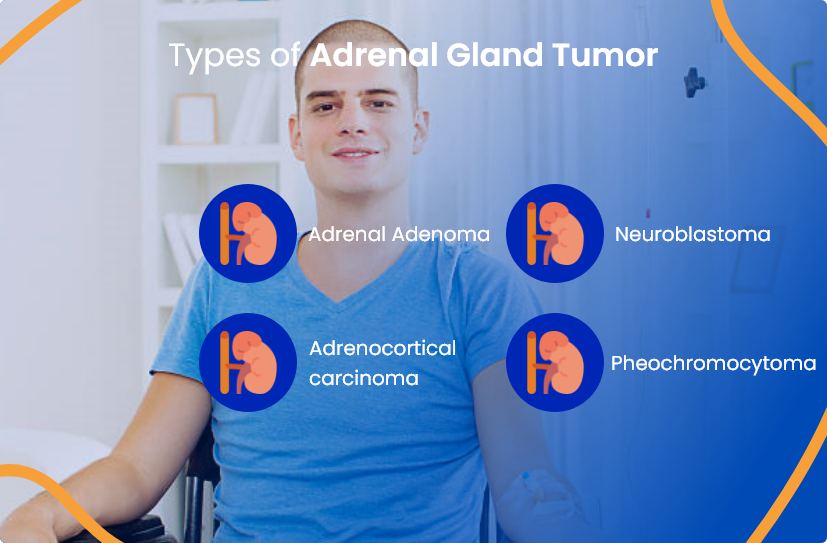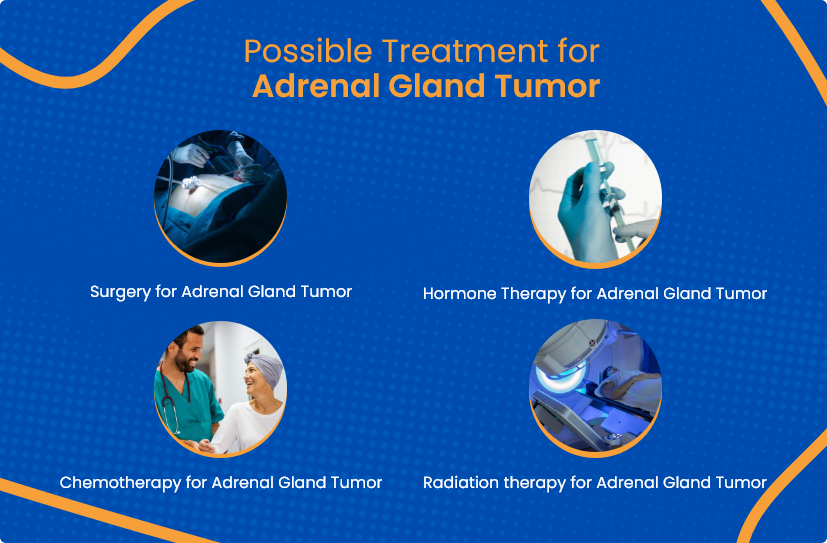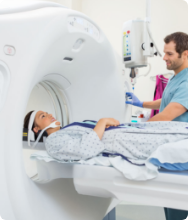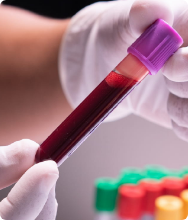
Book a Consultation
Thank you!
Your form has been sent successfully.

An adrenal gland tumor occurs when adrenal gland cells multiply and grow uncontrollably, resulting in the creation of an abnormal mass of tissue. The adrenal gland is a small endocrine gland on the top of the kidneys. These tumors may be malignant or non-cancerous (benign). When this type of tumor produces excessive hormones, it is called a functioning tumor. Non-functioning adrenal tumors do not produce hormones.
A primary adrenal gland tumor begins in the adrenal gland. The adrenal tumor may also occur from cancer that spreads through metastasis from another organ. Various types of adrenal tumors are as follows:

An adenoma is the most common non-cancerous adrenal cortex tumor, also known as an adrenocortical adenoma. On the basis of the hormones produced, it can be further classified as
Adrenocortical carcinoma is the most common cancerous adrenal gland tumor. Such a tumor can be functioning (secretes excessive hormones) or non-functioning (does not produce hormones).
Neuroblastoma is rare cancer most commonly seen in infants and young children. It starts from one of the adrenal medulla cells but can also start from the neck, spine, abdomen, or chest.
Pheochromocytoma is a neuroendocrine tumor that starts in the adrenal medulla. According to the National Cancer Institute, most adrenal pheochromocytomas are non-cancerous. Only 10% of pheochromocytomas metastasize.
The symptoms of adrenal gland tumors are caused by either the excessive production of hormones or the enlarged size of the gland. Common signs and symptoms of may include:
 High blood pressure
High blood pressure
 High blood sugar
High blood sugar
 Weak bones
Weak bones
 Fat deposits, especially in the cheek areas, behind the neck and shoulders
Fat deposits, especially in the cheek areas, behind the neck and shoulders
 Heart palpitations, nervousness, and anxiety
Heart palpitations, nervousness, and anxiety
 Unexplained weight gain or loss
Unexplained weight gain or loss
 Muscle weakness
Muscle weakness
 Nausea, vomiting, abdominal bloating, and loss of appetite
Nausea, vomiting, abdominal bloating, and loss of appetite
 Hormone changes in women may lead to excessive facial hair growth and irregularities in the menstrual cycle.
Hormone changes in women may lead to excessive facial hair growth and irregularities in the menstrual cycle.
 Hormone changes in men may lead to enlarged breast tissue and shrinkage of testicles.
Hormone changes in men may lead to enlarged breast tissue and shrinkage of testicles.
Adrenal gland tumor treatment options depend on the type, stage, and overall health of the patient.

A surgical endocrinologist surgically removes the adrenal tumor. The procedure is called adrenalectomy. Depending on the location and size of the tumor, adrenal cancer doctors may perform a minimally invasive surgical technique called laparoscopic surgery. Surgical removal is the primary treatment for pheochromocytoma.
This therapy balances hormone levels in the body by blocking the effects of excessive hormone production by the adrenal tumor.
Chemotherapy uses anti-cancer drugs injected intravenously or administered orally, which then enter the bloodstream and reach and destroy rapidly growing cancer cells.
Radiation therapy uses high-energy radiation to kill cancerous cells and treat these tumors. Radiation can be delivered via an external machine outside of the body, which is called external beam radiotherapy.
For a definitive diagnosis of adrenal gland tumor, various methods are used after considering the patient's symptoms, age, and general health.

It measures the amount of adrenal hormone to help determine whether the tumor is functional or non-functional. A 24-hour urine sample is collected to track the rate of production of hormones.

A small sample of tissue is removed for microscopic examination. A fine hollow needle is guided under imaging procedures like a CT scan to collect the tissue sample.

High-intensity radiation is used to produce detailed 3-dimensional computerized images. They are used to locate and measure the tumor's size. Various imaging tests used are:

In rare symptomatic cases, CT and MRI may not detect this kind of tumor. Cancer doctors may then test blood from each adrenal gland to determine whether the production of hormones is unilateral or bilateral.
The oncologists at ACTC, Florida, are dedicated to providing exceptional patient care - prescribing effective personalized and evidence-based treatment plans for their patients. We strive to establish a positive environment for patients and their families throughout their cancer journey focusing on physical and mental health simultaneously. We have some of the most accomplished cancer specialists working on our team.
The following are our providers who you can consult at ACTC:

Hematology/Oncology

Hematology/Oncology

Radiation Oncology

If you or a loved one has been diagnosed with adrenal cancer, a detailed discussion with your primary physician will help you understand your condition better. Your PCP can then refer you to an advanced specialty center such as ACTC in Florida.
As one of Florida's best cancer centers, we understand how a cancer diagnosis and therapy impact a person's physical and emotional well-being. Therefore, we work hard to make patients and their families feel secure. We understand how imperative it is for you and your loved one to make informed choices and play an active part in your medical care. We at ACTC strive to support you at every step of diagnosis, staging, treatment, and long-term follow-up in one convenient location. Our cancer specialists are supported by qualified clinical staff with over two decades of experience and a reputation for providing personalized cancer treatment.
Schedule a consultation by calling
 352-345-4565
352-345-4565
According to the American Cancer Society, genetic defects cause 15% of adrenal gland cancer. Apart from it, there is no definitive cause for adrenal cancer.
Adrenal cancers are hard to diagnose early. By the time they are detected, they have grown quite large. Compared to adults, it can be found early in children as adrenal gland cancer is likely to secrete excessive hormones leading to various adrenal tumor symptoms.
An adrenal tumor may press on nearby organs, which may cause pain. You may feel full in the abdomen and have trouble eating due to the feeling of filling up easily.
ACTC is one of Florida's leading cancer specialty centers, which offers personalized and comprehensive cancer care in a modern, state-of-the-art facility close to home. You can schedule a consultation by calling 352-345-4565 or completing the online form at www.actchealth.com (we can give the link to the form here)
Schedule a consultation by calling
 352-345-4565
352-345-4565